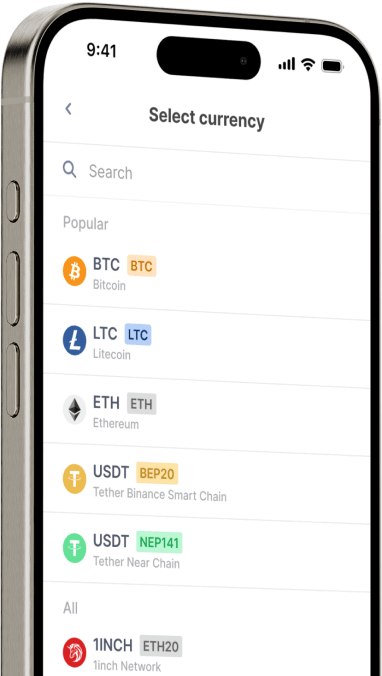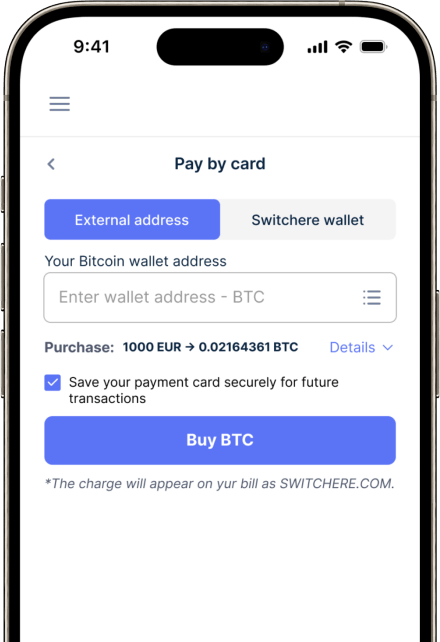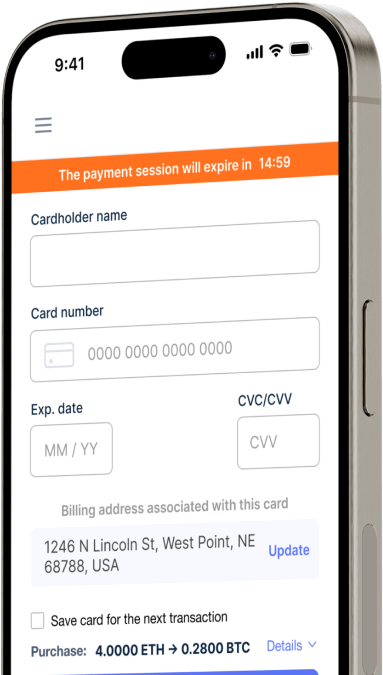Convert
New Zealand Dollar (NZD) to Binance USD (BUSD) Instantly
Purchase Binance USD (BUSD) with New Zealand Dollar (NZD) easily at Switchere and benefit from fast, secure transactions.
About
Binance USD (BUSD)
BUSD (BUSDBSC) is a regulated, fiat-backed stablecoin pegged 1:1 to the US dollar, designed to provide price stability within the volatile digital asset landscape. Issued by Paxos Trust Company in partnership with Binance, BUSD aims to offer a reliable medium of exchange and store of value. The "BUSDBSC" ticker specifically denotes its presence as a BEP-20 token on the BNB Smart Chain, a high-performance decentralized network facilitating extensive DeFi applications. The core technology behind BUSD relies on transparent, audited US dollar reserves held in dedicated accounts, ensuring each token is backed by an equivalent amount of fiat currency. This contrasts with algorithmic stablecoins, offering a different approach to maintaining its peg and cryptographic security.
The primary utility of BUSD, particularly its BUSDBSC variant, is to enable seamless transactions and participation in the BNB Chain's ecosystem with minimal price risk. Its tokenomics are straightforward: new BUSD is minted when dollars are deposited with Paxos, and burned when redeemed, maintaining the 1:1 backing. Prominent use cases include trading against other cryptocurrencies on exchanges like PancakeSwap, serving as collateral in lending and borrowing protocols, yield farming within various DeFi applications, and facilitating peer-to-peer payments. As an NYDFS-approved (for the Paxos-issued Ethereum version) and widely adopted stablecoin, BUSD plays a significant role in providing liquidity and a trusted, compliant digital dollar representation on various blockchain technology platforms, acting as a foundational element for many Web3 infrastructures and on-chain financial activities.
Buy Other 150+ Cryptocurrencies for New Zealand Dollar (NZD)
Other Coins for New Zealand Dollar (NZD)
-
NZD to ZRX
-
NZD to 1INCH
-
NZD to AAVE
-
NZD to ACH
-
NZD to ALGO
-
NZD to TLM
-
NZD to ANKR
-
NZD to APE
-
NZD to NFT
-
NZD to API3
-
NZD to APT
-
NZD to ARPA
-
NZD to AUDIO
-
NZD to AVAX
-
NZD to AVAX
-
NZD to AXS
-
NZD to BADGER
-
NZD to BAL
-
NZD to BNT
-
NZD to BAT
-
NZD to BNB
-
NZD to BUSD
-
NZD to BSW
-
NZD to BSV
-
NZD to BLUR
-
NZD to BONE
-
NZD to CTSI
-
NZD to CELR
-
NZD to CELO
-
NZD to CEL
-
NZD to LINK
-
NZD to CHZ
-
NZD to CHR
-
NZD to C98
-
NZD to COMP
-
NZD to CFX
-
NZD to PEOPLE
-
NZD to CVX
-
NZD to ATOM
-
NZD to CTC
-
NZD to CRV
-
NZD to DAI
-
NZD to DASH
-
NZD to MANA
-
NZD to DENT
-
NZD to DGB
-
NZD to LEASH
-
NZD to DYDX
-
NZD to XEC
-
NZD to EOS
-
NZD to ETC
-
NZD to ENS
-
NZD to ETHW
-
NZD to FET
-
NZD to FIL
-
NZD to FLOKI
-
NZD to GALA
-
NZD to GNO
-
NZD to ONE
-
NZD to HBAR
-
NZD to HOT
-
NZD to HOOK
-
NZD to ICX
-
NZD to ILV
-
NZD to IMX
-
NZD to INJ
-
NZD to ICP
-
NZD to IOST
-
NZD to IOTX
-
NZD to JASMY
-
NZD to JST
-
NZD to KAVA
-
NZD to KCS
-
NZD to KSM
-
NZD to KNC
-
NZD to LDO
-
NZD to LQTY
-
NZD to LPT
-
NZD to LOOKS
-
NZD to LRC
-
NZD to LUNA
-
NZD to MKR
-
NZD to MASK
-
NZD to EGLD
-
NZD to ALICE
-
NZD to NEAR
-
NZD to XEM
-
NZD to NEXO
-
NZD to NOT
-
NZD to NMR
-
NZD to OKB
-
NZD to OMG
-
NZD to ONT
-
NZD to EDU
-
NZD to OP
-
NZD to OGN
-
NZD to CAKE
-
NZD to PAXG
-
NZD to PENDLE
-
NZD to DOT
-
NZD to POL
-
NZD to QTUM
-
NZD to QNT
-
NZD to RDNT
-
NZD to XRD
-
NZD to RVN
-
NZD to REN
-
NZD to RSR
-
NZD to RLC
-
NZD to RPL
-
NZD to SFP
-
NZD to SHIB
-
NZD to SKL
-
NZD to SXP
-
NZD to STND
-
NZD to STG
-
NZD to XLM
-
NZD to GMT
-
NZD to STORJ
-
NZD to STMX
-
NZD to SUSHI
-
NZD to SNX
-
NZD to USDT (NEP141)
-
NZD to USDT (FA2)
-
NZD to USDT (TRC20)
-
NZD to USDT (JETTON)
-
NZD to USDT (SPL)
-
NZD to USDT (ERC20)
-
NZD to USDT (AVAC)
-
NZD to USDT (BEP20)
-
NZD to USDT (Polygon)
-
NZD to XTZ
-
NZD to GRT
-
NZD to SAND
-
NZD to TFUEL
-
NZD to THETA
-
NZD to RUNE
-
NZD to TON
-
NZD to TUSD (BEP20)
-
NZD to TUSD (TRC20)
-
NZD to TWT
-
NZD to UOS
-
NZD to UMA
-
NZD to UNI
-
NZD to USDC (SPL)
-
NZD to USDC (Polygon)
-
NZD to USDC (OP)
-
NZD to USDC (TRC20)
-
NZD to USDC (BEP20)
-
NZD to USDC (BEP20)
-
NZD to USDC (AVAC)
-
NZD to USDC (ARB)
-
NZD to USDC (ERC20)
-
NZD to VET
-
NZD to VRA
-
NZD to WAXP
-
NZD to WOO
-
NZD to WLD
-
NZD to WBTC
-
NZD to WMINIMA
-
NZD to XDC
-
NZD to YFI
-
NZD to YGG
-
NZD to ZIL
How to Buy Binance USD (BUSD)
Frequently Asked Questions
-
What is the NZD/BUSD trading pair and how does it function?
The NZD/BUSD pair represents the exchange rate between the New Zealand Dollar (NZD), a fiat currency, and Binance USD (BUSD), a stablecoin. BUSD is a digital asset pegged 1:1 to the US Dollar, issued by Paxos and approved by the NYDFS. Trading this pair involves using a fiat on-ramp to convert NZD into BUSD, effectively moving from a traditional currency to a price-stable digital asset on the blockchain, commonly on the BEP-20 standard.
-
What is the strategic advantage of holding BUSD over NZD for a crypto trader?
The primary advantage is stability and accessibility within the crypto ecosystem. BUSD, being a 1:1 USD-pegged stablecoin, protects against the volatility of other digital assets. It allows traders to secure profits or wait for market opportunities without converting back to fiat NZD, thus avoiding off-ramp fees and delays. BUSD is also a foundational asset in DeFi protocols, particularly on the BNB Smart Chain, providing liquidity and yield opportunities.
-
What kind of fees are involved in an NZD to BUSD transaction?
Several fees can apply. First, there may be a deposit fee for funding your exchange account with NZD, which varies by method (e.g., bank transfers are often cheaper than cards). Second, the exchange will charge a trading fee (maker or taker fee) for executing the NZD/BUSD order. Finally, if you withdraw your BUSD to an external digital wallet, a blockchain network fee will apply, which depends on whether you are withdrawing a BEP-20 or ERC-20 version of the token.
-
What are the common methods for purchasing BUSD with New Zealand Dollars?
To buy BUSD with NZD, you typically use a cryptocurrency exchange that supports NZD deposits. Common payment methods include direct NZ bank transfers, POLi payments, and debit/credit card purchases. All reputable platforms will require you to complete a KYC/AML (Know Your Customer/Anti-Money Laundering) verification process before you can link your bank account and begin trading.
-
Are there regulatory considerations when converting NZD to BUSD?
Yes. While BUSD itself is a regulated stablecoin issued by Paxos under the supervision of the New York State Department of Financial Services (NYDFS), the transaction from NZD occurs on a cryptocurrency exchange. These exchanges, when operating with New Zealand customers, must comply with local NZ financial regulations, including mandatory KYC/AML checks and reporting requirements under the Financial Transactions Reporting Act.
-
How can I securely store BUSD after purchasing it with NZD?
For optimal security, it is best practice to move your BUSD from the cryptocurrency exchange to a non-custodial digital wallet where you control the private keys. Options include hardware wallets (like Ledger or Trezor) for the highest security, or reputable software wallets (like MetaMask or Trust Wallet) that support the BNB Smart Chain (for BEP-20 BUSD) or Ethereum (for ERC-20 BUSD). Never share your private keys or seed phrase.




